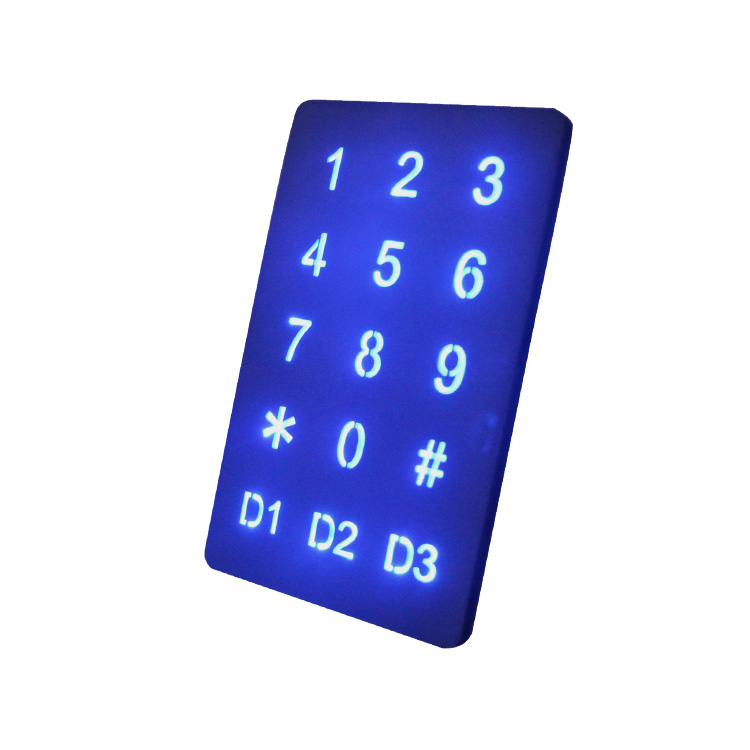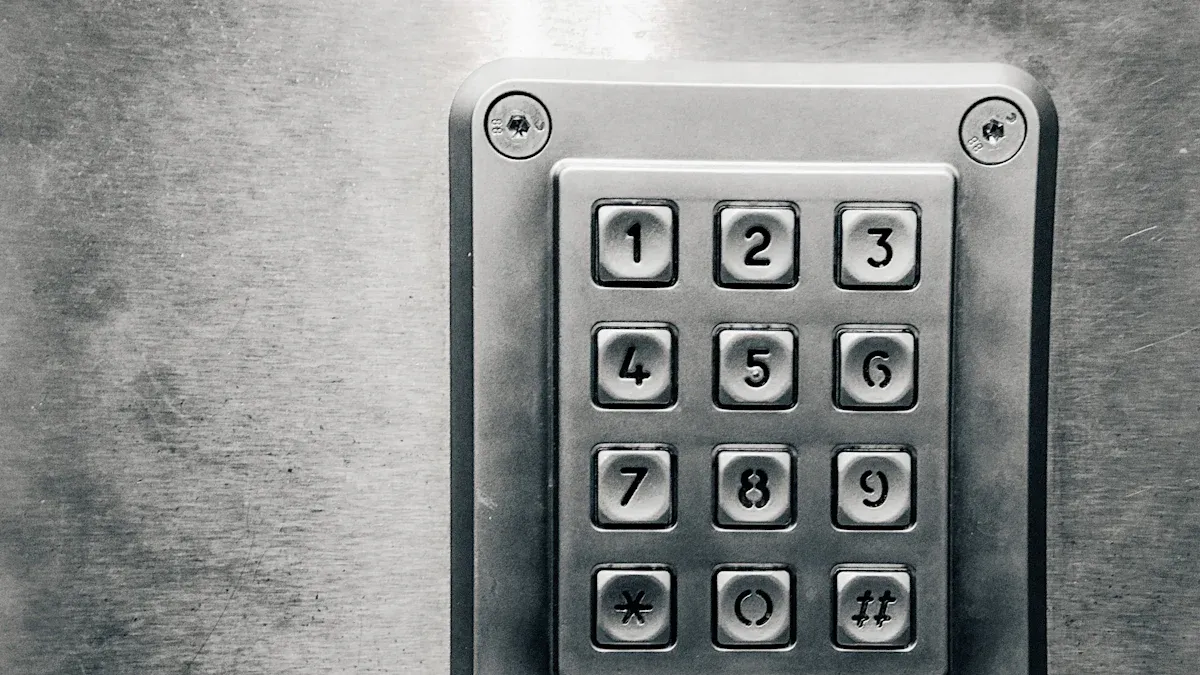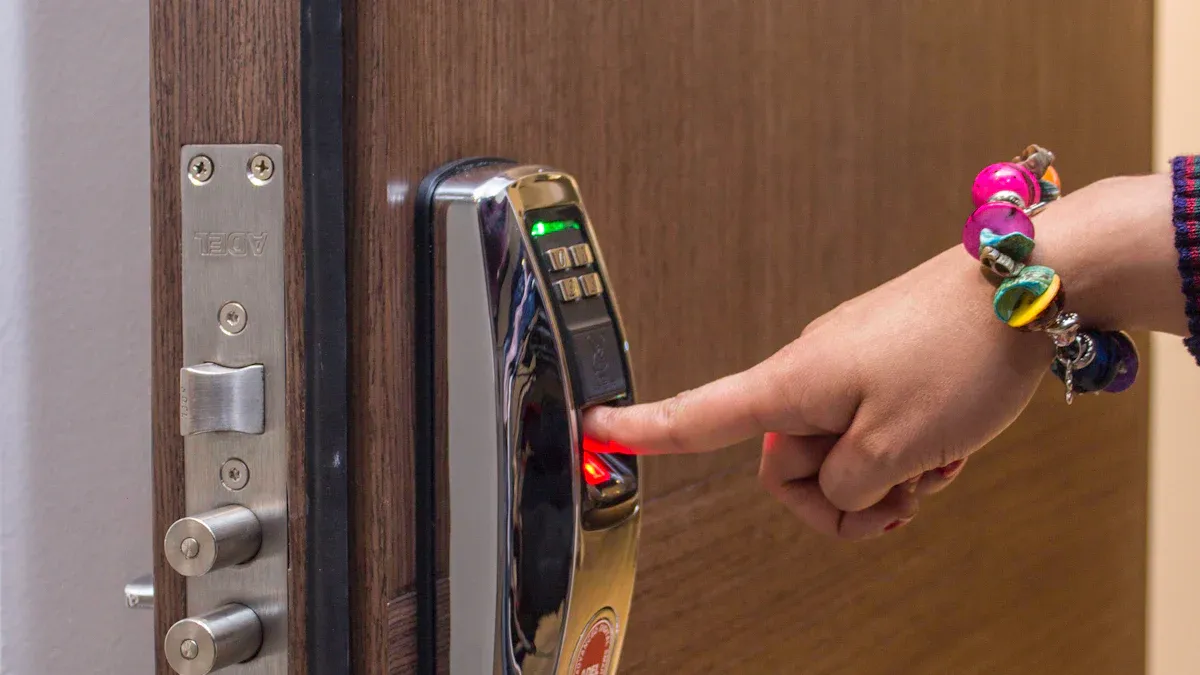
Entry points in busy or harsh environments demand reliable access control. An industrial metal keypad resists tampering and withstands extreme weather. Many locations with lower traffic or mild climates may not need this level of protection.
Choosing the right device depends on site conditions, security priorities, and daily use.
Key Takeaways
- Industrial metal keypads offer strong durability, security, and weather resistance, making them ideal for harsh or high-traffic environments where reliability matters most.
- Alternatives like plastic keypads, touchscreens, and mobile access provide convenience and flexibility but may lack the toughness and tamper resistance of metal keypads.
- Choosing the right keypad depends on your site’s security needs, environment, and user habits; regular maintenance helps keep metal keypads working smoothly over time.
Understanding Industrial Metal Keypad Solutions

What Is an Industrial Metal Keypad?
An industrial metal keypad serves as a robust input device designed for environments that demand high durability and reliability. Manufacturers use metals such as stainless steel, anodized aluminum, and sometimes brass to construct these keypads. These materials provide resistance to corrosion, vandalism, and harsh weather. The construction features a sturdy metal panel with multiple functional buttons, often engraved or printed with clear labels for easy identification.
| Aspect | Description |
|---|---|
| Materials | Made from metals such as stainless steel or aluminum for durability and corrosion resistance. |
| Construction | Rugged and sturdy metal panel with multiple functional buttons, often engraved or printed labels. |
| Features | Backlighting for visibility, IP ratings for dust and water resistance, safety features like emergency stop buttons, customizable layouts. |
| Intended Use | Designed for controlling industrial equipment, machinery, and appliances where durability and reliability are critical. |
| Additional Notes | Wiring and connection points for integration; some versions combine metal panels with touchscreens for versatile control. |
Most industrial metal keypads for door entry intercom systems use stainless steel, anodized aluminum, or brass. These materials ensure the keypad can withstand frequent use and attempts at tampering.
How Industrial Metal Keypads Enhance Door Entry Intercom Systems
Industrial metal keypads improve the performance and reliability of door entry intercom systems in several ways. Their rugged design allows them to function in demanding environments such as correctional facilities, petroleum refineries, and outdoor entry points. Many models, like Barantech’s touch metal piezo switches, have no moving parts. This design reduces wear and tear, making them highly durable under heavy use and even abuse.
Keypads with piezoelectric operation do not require external power for the switch mechanism, which lowers the risk of failure. Their resistance to weather and extreme temperatures makes them suitable for outdoor installations where traditional keypads might fail. These features help extend the lifespan of the entire door entry intercom system, reducing maintenance needs and minimizing downtime.
Tip: Facilities that experience high traffic or risk of vandalism benefit most from the reliability and longevity of industrial metal keypads.
Key Benefits: Durability, Security, and Weather Resistance
The primary advantages of using an industrial metal keypad include:
-
Durability: The use of stainless steel, anodized aluminum, or brass ensures the keypad resists physical damage and corrosion. Many models feature anti-vibration fills to reduce the impact of shock and vibrations, supporting continuous 24/7 operation.
-
Security: The robust construction deters tampering and vandalism. Engraved or printed labels remain visible even after years of use.
-
Weather Resistance: Industrial metal keypads often carry high IP ratings, which measure protection against dust and water. For example:
IP Rating Description Typical Usage in Industrial Metal Keypads IP65 Protection against dust and low-pressure water jets Common in wireless keypads offering good durability IP67 Dust tight and protection against immersion up to 1m Recommended for wired keypads for highest protection IP68 Dust tight and protection against continuous immersion Highest protection level for harsh industrial environments
These keypads are engineered to endure extreme temperatures, moisture, and dust. Their intelligent design and high-quality components ensure reliable performance in challenging settings. Maintenance requirements remain low, which is essential for industrial and outdoor applications.
Note: Choosing an industrial metal keypad for a door entry intercom system ensures consistent operation, even in the harshest conditions.
Choosing Between Industrial Metal Keypads and Alternatives

Common Alternatives: Plastic Keypads, Touchscreens, and Mobile Access
Many door entry intercom systems use alternatives to industrial metal keypads. Plastic keypads, touchscreens, and mobile access solutions each offer unique advantages. Plastic keypads often cost less and suit indoor environments with low traffic. Touchscreens provide a modern look and allow for flexible user interfaces. Mobile access systems use smartphones, enabling users to unlock doors with an app or digital credential.
- Mobile access control systems increase security by using biometric features like fingerprint or facial recognition.
- Cloud-based management allows administrators to expand access and monitor activity remotely.
- Users benefit from convenience, as they rarely forget their smartphones.
- Real-time monitoring and dynamic access permissions improve control for large facilities.
However, these alternatives also present security challenges. Lost or stolen mobile devices can grant unauthorized access if not managed properly. Touchscreens may reveal passcodes through fingerprint residues. Wireless locks and touchpads can be vulnerable if communication channels lack proper encryption. Backup methods, such as PINs or RFID cards, help maintain security when using these technologies.
Drawbacks and Limitations of Industrial Metal Keypads
Industrial metal keypads deliver high durability and security, but they have limitations. Mechanical wear remains a concern, especially in high-traffic areas. Components such as pilot lights or buttons can become unresponsive over time. Wiring faults may cause erratic behavior or false alerts. Environmental factors like dust and debris can lead to malfunction if not addressed with regular cleaning and maintenance.
| Failure Point | Cause/Description | Impact/Effect on Keypad Functionality | Mitigation/Alternative Approaches |
|---|---|---|---|
| Mechanical Wear | Worn components such as pilot light damage | Causes unresponsiveness and erratic behavior | Expert inspection, repair, and use of alternative switch types (e.g., piezo, capacitive) |
| Wiring Faults | Loose or faulty wiring connections | Signal instability, false alerts, erratic switch behavior | Secure wiring, regular inspection, and maintenance |
| Environmental Damage | Exposure to dust, harsh weather, and debris buildup | Physical degradation leading to malfunction | Regular cleaning, protective housing, and alternative designs less prone to wear |
| Misalignment/Debris | Debris buildup or mechanical misalignment | Erratic pressure readings and unresponsiveness | Cleaning, alignment checks, and preventive maintenance |
Industrial metal keypads also face challenges with user management. PIN sharing and human error can reduce security. These systems may not scale as easily as cloud-based or mobile solutions.
When Industrial Metal Keypads Are Essential
Certain environments require the strength and reliability of an industrial metal keypad. Facilities exposed to harsh weather, frequent use, or high risk of vandalism benefit most from these devices. Correctional institutions, transportation hubs, and industrial plants often choose metal keypads for their robust construction and tamper resistance.
| Feature/Aspect | Industrial Metal Keypads with Anti-Vandal Switches | Standard Keypads (e.g., Computer Keyboard Buttons) |
|---|---|---|
| Material | Stainless steel or aluminum enclosures, robust and reinforced | Plastic or less durable materials |
| Construction | Sealed with IP65/IP67 ratings for dust and moisture resistance | Typically not sealed, vulnerable to environmental damage |
| Tamper Resistance | Anti-pry designs, reinforced casing, higher actuation force required | Keys can be easily removed or rearranged |
| Usage Environment | Designed for harsh, rugged industrial and high-security locations | Generally for standard office or consumer use |
| Durability | Long life expectancy, resistant to damage from sharp or heavy objects | More prone to physical damage and vandalism |
| Security Implications | Reduced risk of tampering and vandalism, enhancing security | Vulnerable to key removal and rearrangement, causing security issues |
The table above shows that industrial metal keypads with anti-vandal switches outperform standard keypads in durability and security. Their reinforced design and high IP ratings protect against both environmental and physical threats. These features make them essential for locations where failure or tampering could compromise safety or operations.
Tip: Facilities with high security requirements or exposure to extreme conditions should prioritize industrial metal keypads for reliable access control.
When Alternatives May Be a Better Fit
Alternatives to industrial metal keypads work well in many modern applications. Mobile access systems, for example, use strong encryption and multi-factor authentication to protect credentials. Administrators can suspend access instantly if a device is lost or stolen. Cloud-based management supports easy expansion and remote monitoring, making these systems ideal for offices, residential complexes, and campuses.
- Mobile access solutions improve convenience and reduce the need for physical keys.
- Touchscreens offer flexible interfaces and can integrate with other smart building systems.
- Plastic keypads provide a cost-effective choice for low-risk, indoor environments.
However, users should remain aware of potential vulnerabilities. Touchscreens can reveal passcodes through fingerprint marks. Wireless systems require secure communication channels to prevent hacking. Backup methods, such as PINs or RFID cards, help maintain security if a primary method fails.
Note: Organizations should evaluate their environment, security needs, and user preferences before selecting an access control solution. Alternatives may offer better scalability and convenience for many sites.
Selecting the right door entry intercom system requires careful evaluation.
- Identify security needs, define access levels, and select suitable technology.
- Install hardware, set up authentication, and monitor access events.
- Industry leaders recommend balancing session timeouts and re-authentication to maintain both security and user satisfaction.
FAQ
Are industrial metal keypads waterproof?
Most industrial metal keypads feature high IP ratings. These ratings protect against dust and water. Many models work reliably outdoors in rain or snow.
Can users replace a metal keypad with a touchscreen?
Users can replace a metal keypad with a touchscreen in low-risk areas. Touchscreens offer flexibility. However, they may not provide the same durability or vandal resistance.
Do metal keypads require special maintenance?
Metal keypads need occasional cleaning to remove dust and debris. Regular inspections help prevent mechanical issues. Most models require less maintenance than plastic or touchscreen alternatives.

